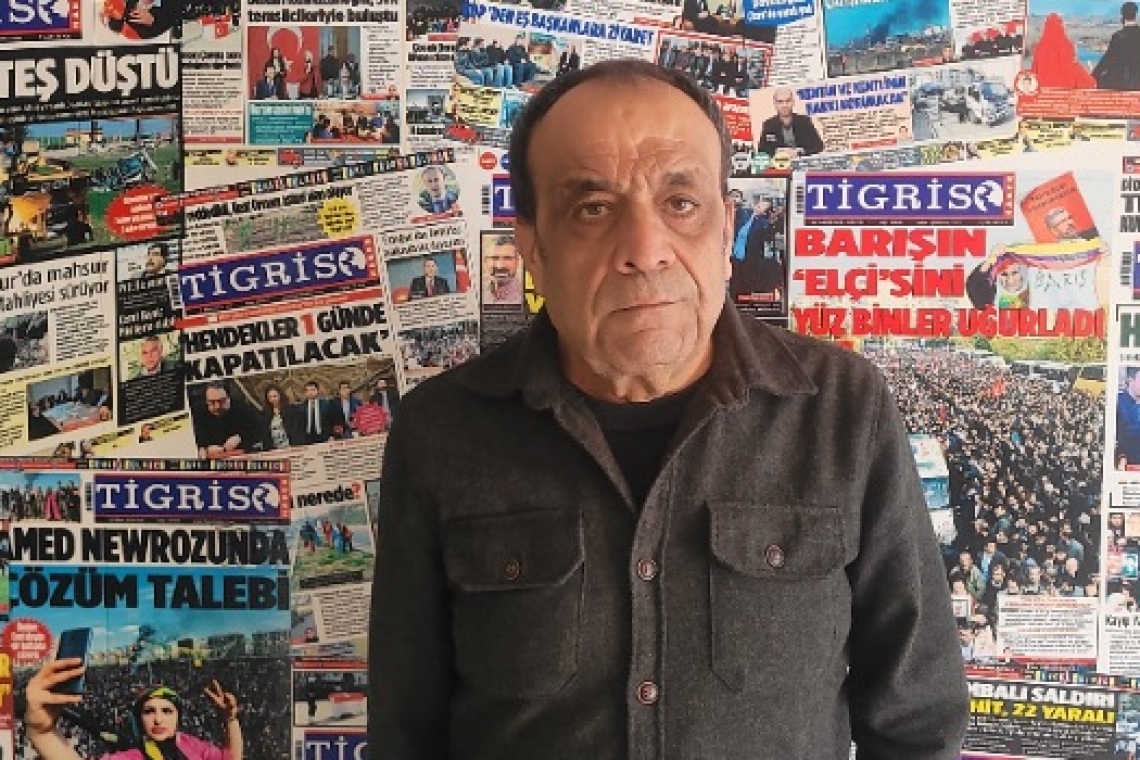A prosecutor has requested the conviction of Turkish journalist Naci Sapan on charges of “insulting public officials working as a board” over a newspaper column criticizing the state-appointed trustee administration in the southeastern city of Diyarbakır. The request came during the second hearing of his trial, which was held on April 16 at the Diyarbakır 5th Criminal Court of First Instance.
Sapan, the editorial coordinator and columnist at Tigris Haber, is on trial for a March 29, 2023, article titled “Trustees and little trustees!” that alleged corruption in a public land tender worth approximately 800 million Turkish lira (about $24.5 million at the time). The case was initially concluded through a simplified procedure, resulting in a 135-day judicial fine. However, following an appeal, a full trial was reopened.
Defense argues the article served the public interest
Sapan attended the hearing along with his lawyer Sertaç Eke and Merve Kübra Çelik, the lawyer representing Şefik Çelik, one of the complainants. The hearing was observed by members of the press, including representatives from the Southeastern Journalists Association and the Media and Law Studies Association (MLSA).
Repeating his previous defense statements, Sapan maintained that the article was written in the public interest. His lawyer argued that the piece addressed a matter of public debate and should be protected under freedom of expression and press freedom. Eke requested the court to inquire whether any criminal or administrative investigations had been conducted during the relevant period and submitted rulings from the European Court of Human Rights, the Court of Cassation, and the Turkish Constitutional Court in similar cases.
Complainant’s lawyer claims media coverage pressures court
Complainant lawyer Merve Kübra Çelik claimed that Sapan had shown no remorse and insisted the offense was clear. She further argued that media attention was exerting pressure on the court, citing coverage of the previous hearing that referred to “trustee corruption.” The judge asked whether these remarks should be included in the court record, and upon the lawyer’s request, they were officially noted.
Following a short recess, the prosecutor presented the final opinion on the case, calling for Sapan to be convicted of “insulting public officials working as a board due to their duties.”
The court rejected the defense's request to include Court of Accounts reports and details of potential investigations related to the tender, saying such documents would not impact the outcome of the trial.
Speaking again in his defense, Sapan stated, “I don’t know the names or members of the tender commission. I wrote the article as a journalist because of the resulting public damage.” He said the piece did not target anyone with hostility or hatred.
His lawyer criticized the claim that the presence of journalists in the courtroom amounted to interference in the judiciary, calling it a problematic stance. When asked by the judge who he meant by the phrase “trustees and little trustees,” Sapan responded, “The article was written in a literary style. I did not insult anyone.”
The court granted time for Sapan and his lawyer to prepare their final defense statements and postponed the trial to May 20.
Background
During a period in which Diyarbakır Metropolitan Municipality was under the administration of a government-appointed trustee, journalist Naci Sapan published a column alleging irregularities and corruption related to a major land tender. Following the article, members of the tender commission and then-Governor of Diyarbakır Ali İhsan Su filed a criminal complaint against Sapan. The Diyarbakır Chief Public Prosecutor’s Office charged him with insulting public officials in their professional capacity.
The case was initially handled under a simplified trial procedure, resulting in a fine of 2,700 Turkish lira and a five-year probation period. Upon appeal, the case was reopened for a full hearing. Press freedom advocates have raised concerns that the trial represents yet another attempt to criminalize critical journalism in Turkey.



